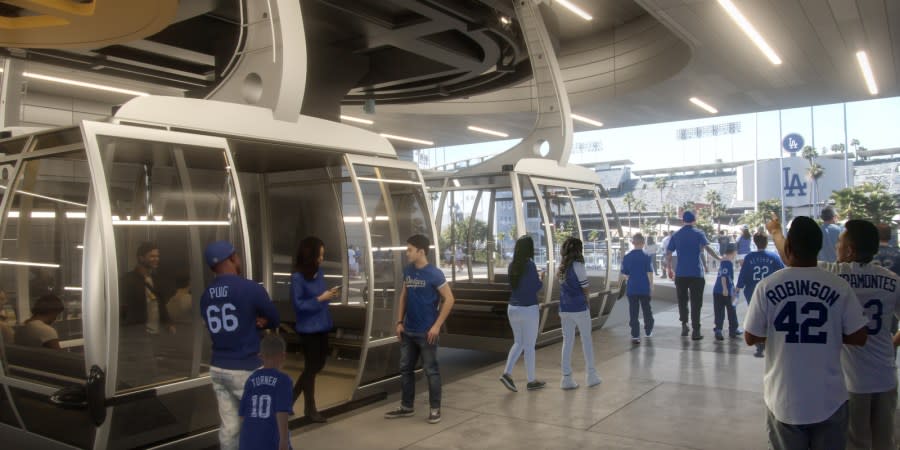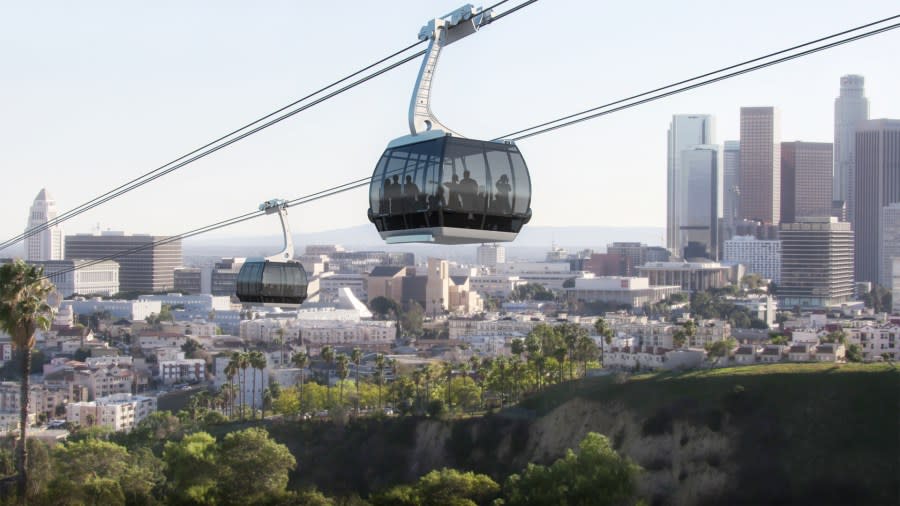Controversial Dodger Stadium gondola project step closer to final approval
The hotly debated transit project connecting Dodger Stadium to downtown Los Angeles cleared yet another hurdle Thursday when the Metro Board of Directors voted to approve the environmental impact report for the venture.
Officially referred to as the Los Angeles Aerial Rapid Transit Project, the endeavor would link the stadium to Union Station and Chinatown at Los Angeles State Historic Park via a suspended gondola system funded by Frank McCourt and his son, Drew.
The elder McCourt owned the Los Angeles Dodgers from 2004 to 2012.
Under the current plan, L.A. Metro would plan the logistics of the project and says the gondola could transport up to 5,000 people per hour in each direction on game days. The 1.2-mile journey would take about seven minutes — though many see it as a “tourist attraction” rather than a reliable transit system.
Supporters of the system tout its zero-emission capabilities and its ability to cut down on traffic concerns on Dodgers’ game days. However, residents who would ultimately live beneath the pathway of the gondola system have voiced rabid opposition.
The environmental impact report said some cables and cabins would pass over private properties and acknowledged that construction noise and vibration would occur. Parts of the construction phase would also require lanes of traffic to be closed, requiring a plan detailing street closures, lights and detours.
A rendering of the Dodger Stadium gondola landing is seen in an image provided by Aerial Rapid Transit Technologies LLC. A rendering of the Chavez Ravine gondola flyover is seen in an image provided by Aerial Rapid Transit Technologies LLC.
A local group dubbed the Stop The Gondola Coalition has blasted the Metro and the McCourts for a supposed lack of transparency surrounding the project.
“The construction price alone is likely to be $500 million, and even more money will be needed for ongoing maintenance and repairs,” a section of the coalition’s website reads. “History has shown that these projects always run past schedule, go way over budget, and leave taxpayers stuck with a huge bill.”
The advocacy group encourages public officials to look at enhancing stadium shuttles to quell traffic concerns on game days. The trek to Chavez Ravine has notoriously been a pain to baseball fans throughout the Southland with a lack of public transit options to get to the ballpark.
Despite these concerns, Metro’s board of directors approved the environmental impact report in a 11-0 vote, with L.A. County Supervisor and Director Janice Hahn abstaining from the vote.
A motion introduced by Supervisor Hilda Solis that would create a community benefits agreement to address concerns of residents impacted by the project was also adopted.
17-year-old third charged in southeast L.A. shooting spree that killed 4, including a child
“For the project to win my vote, it needs transparency guarantees and addresses community priorities and concerns,” Solis said ahead of the vote.
The project will now have to be considered by the L.A. City Council, Caltrans, the California Department of Parks and Recreation and the California Division of Occupational Safety and Health before it returns to the Metro board for construction approval.
City News Service contributed to this report.
For the latest news, weather, sports, and streaming video, head to KTLA.


